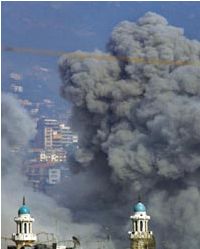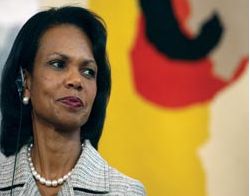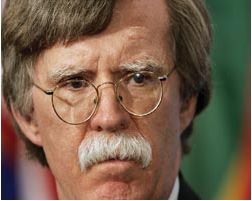Pity the Nation, Again
The Middle East’s latest crisis erupted with little warning on the morning of Wednesday, July 12, when a bunch of Hezbollah fighters crossed Lebanon’s southern border and ambushed a small Israeli military contingent, killing up to eight soldiers and taking two of them prisoner. In retaliation, Israel lost little time in launching bombing raids that targeted Beirut airport and bridges across Lebanon before spreading to residential areas and other civilian infrastructure, such as power plants.
The aim, Israel said, was not only to win the release of the two captured soldiers, but to eliminate once and for all, the threat posed by Hezbollah across its northern border. The militant Shia organisation responded with a barrage of Katyusha rockets aimed at Haifa and other northern Israeli towns.
The bloody conflict erupted as the leaders of eight of the world’s most powerful nations were attending a summit in St Petersburg. Whether or not it would have had any immediate effect on the warring parties, it wasn’t unreasonable to expect a collective call for a ceasefire. It never came, although the majority of leaders would have found it unobjectionable. Among them, however, were a pair of recalcitrants. A private conversation between the two, picked up by a live microphone, suggested that at least one of them had a particularly Manichean perspective on the situation. “You see,” he was heard telling the other between bites on a bread roll, “the thing is, what they need to do is to get Syria to get Hezbollah to stop doing this shit, and it’s over.”
The author of that characteristically eloquent analysis of the situation was, of course, George W. Bush, while Tony Blair hovered obsequiously behind him like a butler, offering his services as a scout for Condoleezza Rice. The British prime minister’s idea of heading to the troubled region to “just talk” (whereas he figured that Condi, “If she goes out, she’s got to succeed”), was brusquely dismissed by the US president, who was anyhow in no rush to despatch his secretary of state in the direction of Lebanon and Israel.
Blair was apparently untroubled by his chief ally’s strategy of allowing Israel to continue its operation for some time, but he appears to naively have assumed that when Rice did eventually head to the Middle East, it would be on a quest for peace. She had nothing of the kind on her mind. On her helicopter ride to Beirut, she couldn’t have failed to notice the destruction all around, nor could she have been unaware of the rapidly mounting death toll and the fact that the overwhelming majority of victims were civilians, one third of them children. She surveyed the horrors of war and saw in them, “the birth pangs of a new Middle East.” Presumably a Middle East in which the balance of terror is decisively tilted in favour of the Israeli Defence Force (IDF).
After her delayed foray into the Middle East, Rice flew to Rome, where a conference on the crisis had been scheduled, albeit without the participation of any of the belligerents, real or presumed. In attendance were representatives of the United Nations, Lebanon, the US, Britain, Egypt, Jordan, Saudi Arabia, Russia, Canada, France, Germany, Spain, Cyprus, Italy, Turkey, the European Union (EU) and the World Bank. Israel and Hezbollah were unrepresented, as were Iran and Syria, who are seen by the west as Hezbollah’s sponsors and suppliers. Among those present, everyone favoured calling for an immediate ceasefire — with two exceptions: Rice and her British counterpart, Margaret Beckett.
A joint statement issued at the end of the conference expressed the determination of the participants, “to work immediately to reach with the utmost urgency a ceasefire”, which is not quite the same thing. At Washington’s insistence, the statement also said that the eventual cessation of hostilities must be “lasting, permanent and durable” — three words that mean more or less the same thing and in effect reflect America’s fervent desire for unchallenged Israeli hegemony in the region. Not unreasonably, Israel interpreted the outcome at Rome as a green light to continue its military operations. This caused consternation in some European capitals, but not in Washington.
 The US (with Britain tagging along), also stymied efforts towards a ceasefire resolution at the UN Security Council, to the visible frustration of Kofi Annan. The UN Secretary-General called not just for an immediate truce, but also for talks with Damascus and Tehran, risking Washington’s ire. He also had occasion to provoke the wrath of Israel when, after four UN peacekeepers in southern Lebanon were killed and many others wounded in an Israeli attack, he noted that the UN post had apparently been deliberately targeted. Israel’s UN ambassador, Dan Gillerman, added insult to injury by describing the claim as “ludicrous, very hasty, unfortunate, appalling and irresponsible,” adding: “Nobody in his right mind would accuse Israel of doing something like that.”
The US (with Britain tagging along), also stymied efforts towards a ceasefire resolution at the UN Security Council, to the visible frustration of Kofi Annan. The UN Secretary-General called not just for an immediate truce, but also for talks with Damascus and Tehran, risking Washington’s ire. He also had occasion to provoke the wrath of Israel when, after four UN peacekeepers in southern Lebanon were killed and many others wounded in an Israeli attack, he noted that the UN post had apparently been deliberately targeted. Israel’s UN ambassador, Dan Gillerman, added insult to injury by describing the claim as “ludicrous, very hasty, unfortunate, appalling and irresponsible,” adding: “Nobody in his right mind would accuse Israel of doing something like that.”
The US did not say whether it agreed with the clear implication that the Secretary-General is out of his mind, but it prevented the Security Council from unequivocally condemning the targeting of members of the UN Interim Force in Lebanon (Unifil). In much the same fashion, the US was instrumental in scuttling an Arab-proposed resolution on the siege of Gaza, which, arguably, led to the border incident that sparked the one-sided war.
Washington is represented at the UN by a comically moustachioed and toupeed ultra-conservative, who appears to have been given the job because he detests everything that the United Nations stands for. John Bolton is so far off the radar ideologically that the US Congress refused to confirm his appointment and Bush used a constitutional loophole to temporarily ensconce him in the post during a congressional recess. His tenure runs out next January, and the White House decided last month to exploit the Lebanese crisis by making a fresh bid for reconfirmation.
When Bolton is on the job, it’s often hard to tell whether he represents the US or Israel, so it’s hardly surprising that the Zionists are even more enamoured of him than the neo-cons. “I’m certainly not going to tell the Senate or the House of Representatives how to vote,” ventured the aforementioned Gillerman, “but if John Bolton were to be confirmed by the Israeli Knesset, he would get all 120 votes.”
Considering the Israeli lobby’s influence on Capitol Hill, after that endorsement, many US legislators would be inclined to think twice before voting to reject the nominee.
Of course, even if Bush were compelled, by some miracle, to pick another punter for the post, it is unlikely that that would resolve the UN’s paralysis. Which is somewhat ironic, given the importance now being attached to Security Council resolution 1559 from two years ago, whereby all Lebanese militias were supposed to be disarmed. It hasn’t been fully implemented, partly because the official Lebanese army (which is largely Shia anyhow), has made no effort to divest Hezbollah of its armouries. But whenever this context comes up, very few commentators in the west go out of their way to mention the fact that there is a long list of Security Council resolutions that Israel has brazenly disobeyed over the decades — without ever attracting even a threat of sanctions.
In keeping with its traditional excuses for overkill, Israel has tried to paint its assault on Lebanon as a picture of self-defence. Furthermore, it has sought to create the impression that in attacking Hezbollah it is not only protecting its own interests, but also doing Lebanon a favour. The wanton murder of hundreds of civilians more than suffices as a counter-argument. Hezbollah, too, can be accused of similar war crimes, albeit on a much smaller scale. Israel’s claim that it has exercised restraint in its bombardments is not outrageous: there can be little question that had it so wished, Israel could have visited death and destruction on Lebanon on a far greater scale. But the fact that it did not do so hardly qualifies as a demonstration of moral rectitude. It had more prosaic reasons for limiting the death toll: casualties in the thousands rather than the hundreds would have changed the tenor of international condemnation (which, barring the US and its British lapdog, has been more or less universal) and made it that much more difficult, even for Washington, to keep the green light switched on.
Hezbollah’s rocket barrages, on the other hand, are presumably the worst it could do. Its arsenal does appear to have been larger than anyone suspected, but its ability to hurt Israel is nonetheless severely restricted. It can inflict bruises, whereas Israel is capable of striking death blows. Israeli military power, however, also has its limitations: it can destroy Lebanon, but it proved incapable of crushing Hezbollah without completely wrecking the host country. Initially, Israeli generals spoke of completing their task within 72 hours. That proved to be a serious miscalculation. A week, they then said. Again they were proved wrong, as the Katyushas kept flying. The time scale then changed to weeks — effectively an indefinite period of time. And the US went along.
Simultaneously, the Israelis also changed their aim from crushing Hezbollah to significantly weakening it. Ground incursions proved costlier than Israel had expected, and the prospect of a full-fledged invasion of southern Lebanon was put on hold. The government began saying that it was willing to accept Hezbollah as a political entity provided it gave up its weapons. Hezbollah, on its part, reportedly agreed to free the two captured soldiers within six hours of a ceasefire. But the two sides weren’t talking directly to each other, and the killing went on.
In the beginning, pro-US Arab countries such as Egypt, Saudi Arabia and Jordan were more vociferous in their criticism of Hezbollah than of Israel. As the days passed without any respite from the Israeli side — and as it became clearer that the Arab masses had been enthused rather than dismayed by Hezbollah’s pluck — Cairo, Riyadh and Amman began changing their tune. Likewise, initial widespread resentment towards Hezbollah within Lebanon gradually gave way to indignation towards Israel and solidarity with its declared foe. In Beirut and so many other Arab capitals, the cleric at Hezbollah’s helm, Sheikh Hasan Nasrallah, began acquiring the status of a folk hero.
Palestinians began looking upon him as a saviour. In Cairo, demonstrators carried his photographs alongside those of Gamal Abdel Nasser. In Damascus, it was posters of Nasrallah and Bashar Al Assad. Iraqi Shia chieftain Moqtada Al Sadr began portraying himself as a fan of Hezbollah. And Tehran, predictably, was crowing amid repeated vows to despatch Israel to some other part of the world. On a visit to Washington, even Iraq’s puppet prime minister, Nouri Al Maliki, felt obliged to defy his hosts by adding his voice to calls for an immediate ceasefire. And Al-Qaeda’s purported second-in-command, Ayman Al Zawahiri, opportunistically released a video featuring a diatribe against Zionists and crusaders in an attempt to ensure that his network’s brand name would not be completely overshadowed by Hezbollah.
The charge that Hezbollah is aided and abetted by Syria and Iran is not entirely without merit: it clearly does have links with those two states, although the precise nature of those links is uncertain. For all that, the organisation is very much a Lebanese phenomenon: apart from its armed wing (whose strength, again, is open to conjecture), it operates a social welfare network that lends some semblance of civility to life in southern Lebanon. It is therefore unrealistic to dismiss it solely as a militia or a terrorist organisation.
Furthermore, it’s also worth recalling the circumstances in which Hezbollah came into being. It did not exist at the time of Israel’s last full-fledged invasion of Lebanon back in 1982 — which cost an estimated 18,000 lives and included the infamous massacres at the Sabra and Chatila Palestinian refugee camps, for which an Israeli commission of inquiry held Ariel Sharon responsible long before he became prime minister. Having driven out the Palestine Liberation Organisation, Israeli troops vacated most of Lebanon, but ensconced themselves on a broad strip in the south (in defiance, incidentally, of UN Security Council resolutions), which they ruled in alliance with a right-wing Christian militia. Hezbollah evolved during this period as a resistance movement, and when Israel finally vacated the strip in 2000, Hezbollah was credited with securing the first Arab success in a war against the Zionist state.
This time around, survival alone will suffice for Hezbollah to declare victory. The biggest tragedy, apart from the loss of lives, is of course that large parts of Lebanon, including numerous neighbourhoods in Beirut, lie in ruins once again, having been painstakingly built up since 1990, when Lebanon’s destructive civil war finally drew to a close. Beirut was beginning to aspire once more to its bygone title of Paris of the East. Its ambitions have been set back by a decade or two. Reconstruction under the auspices of Rafik Hariri cost far more than anticipated because of kickbacks. But the rotund businessman-turned-statesman wasn’t unpopular, and his assassination last year spurred a popular drive to end the Syrian presence in Lebanon.
The strategy of mass demonstrations combined with international pressure worked well enough, and the last Syrian troops left the country. It has lately been assumed that Syria has helped to provoke the latest crisis in order to pave a path back for Syria. The assumption was based on conjecture, but if it’s true, there are chances Bush might be willing to lend Assad a helping hand — particularly if it succeeds in distancing Damascus from Tehran.
Iran, meanwhile, is suspected of seeking a distraction from the pressure against its nuclear programme. That, again, is conjecture. What’s less uncertain is that Syria and Iran are likely to emerge as the biggest beneficiaries of Israel’s power play. The rape of Lebanon has also taken the focus away from the deteriorating conditions in Baghdad and the siege of the Gaza Strip that followed the capture of an Israeli soldier. There, as in Lebanon, Israel responded with collective punishment of the population and degradation of the infrastructure.
In Prime Minister Ehud Olmert and defence minister Amir Peretz, Israel has a pair of leaders without military experience — which helps to explain their eagerness to be seen as tough. In the long term, however, this won’t pay dividends. Even if Israel could eliminate Hezbollah and decimate Hamas, others would inevitably take their place. Entering into David and Goliath contests — with Israel playing Goliath, needless to say, notwithstanding the Star of David it supposedly bears allegiance to — won’t solve anything.
It is perfectly reasonable of Israel to seek security against attackers and intruders. Hopefully, one day it will realise that this can only be achieved in the context of a comprehensive peace settlement that guarantees a coherent and equally secure Palestinian state, rather than by devouring the children of its perceived enemies.
Mahir Ali is an Australia-based journalist. He writes regularly for several Pakistani publications, including Newsline.




